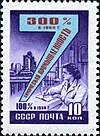Wikipedia:Today's featured article/April 23, 2012
Broad-sweeping wage reforms were instituted in the Soviet Union during the Khrushchev era, from 1956 through 1962. These were intended to move Soviet industrial workers away from the mindset of overfulfilling quotas that had characterised the Soviet economy during the preceding Stalinist period, and toward a more efficient financial incentive. Throughout the Stalinist period, most Soviet workers had been paid for their work based on a piece-rate system. Thus their individual wages were directly tied to the amount of work they achieved. This policy was intended to encourage workers to toil and therefore increase production as much as possible. The piece-rate system led to an enormous level of bureaucracy and contributed to huge inefficiencies in Soviet industry. Additionally, factory managers frequently manipulated the personal production quotas given to workers to prevent workers' wages from falling too low. The wage reforms sought to remove these wage practices and offer an efficient financial incentive to Soviet workers by standardising their wages and reducing their dependence on overtime or bonus payments. (more...)
Recently featured: Kathleen Ferrier – 2009 Orange Bowl – Convention of 1832

